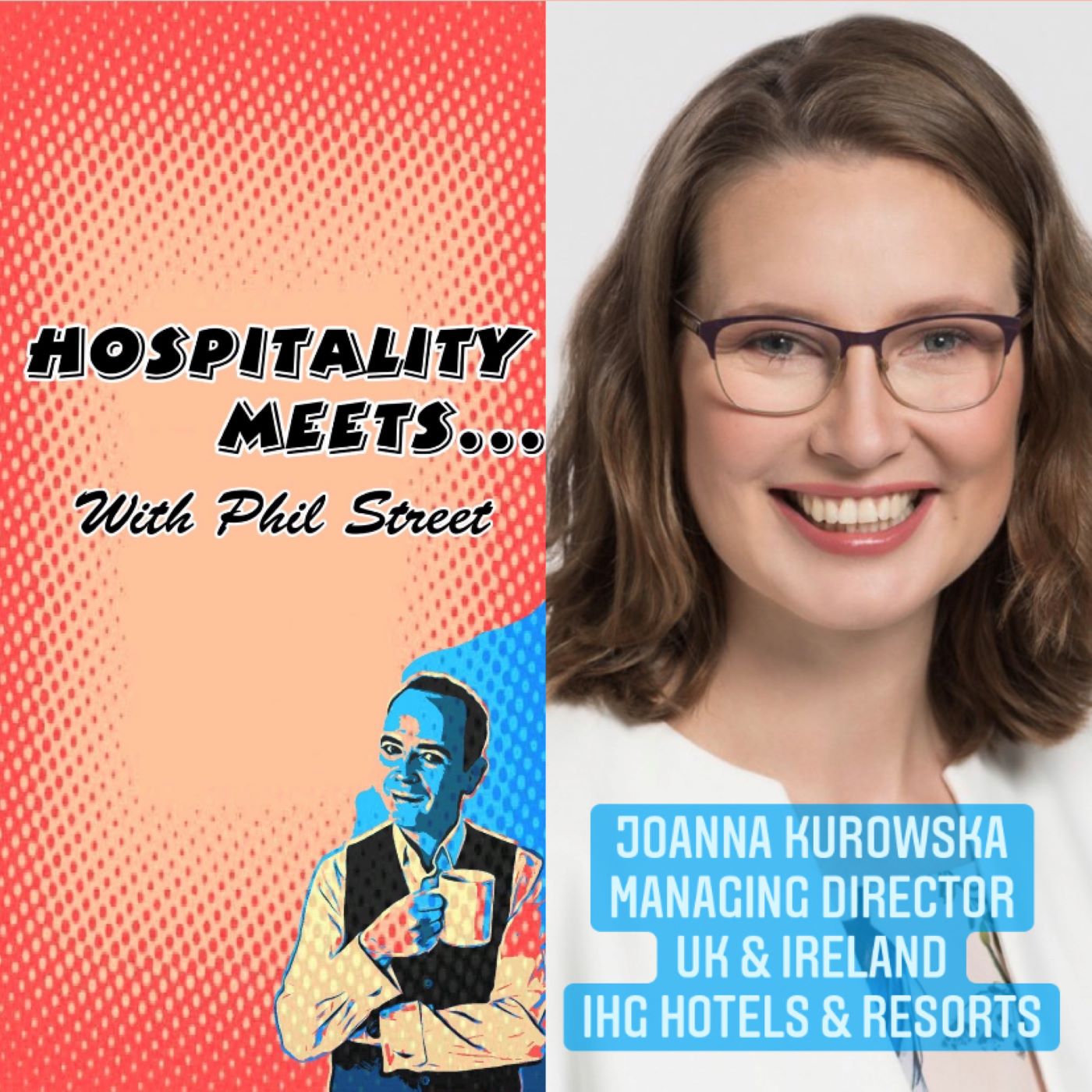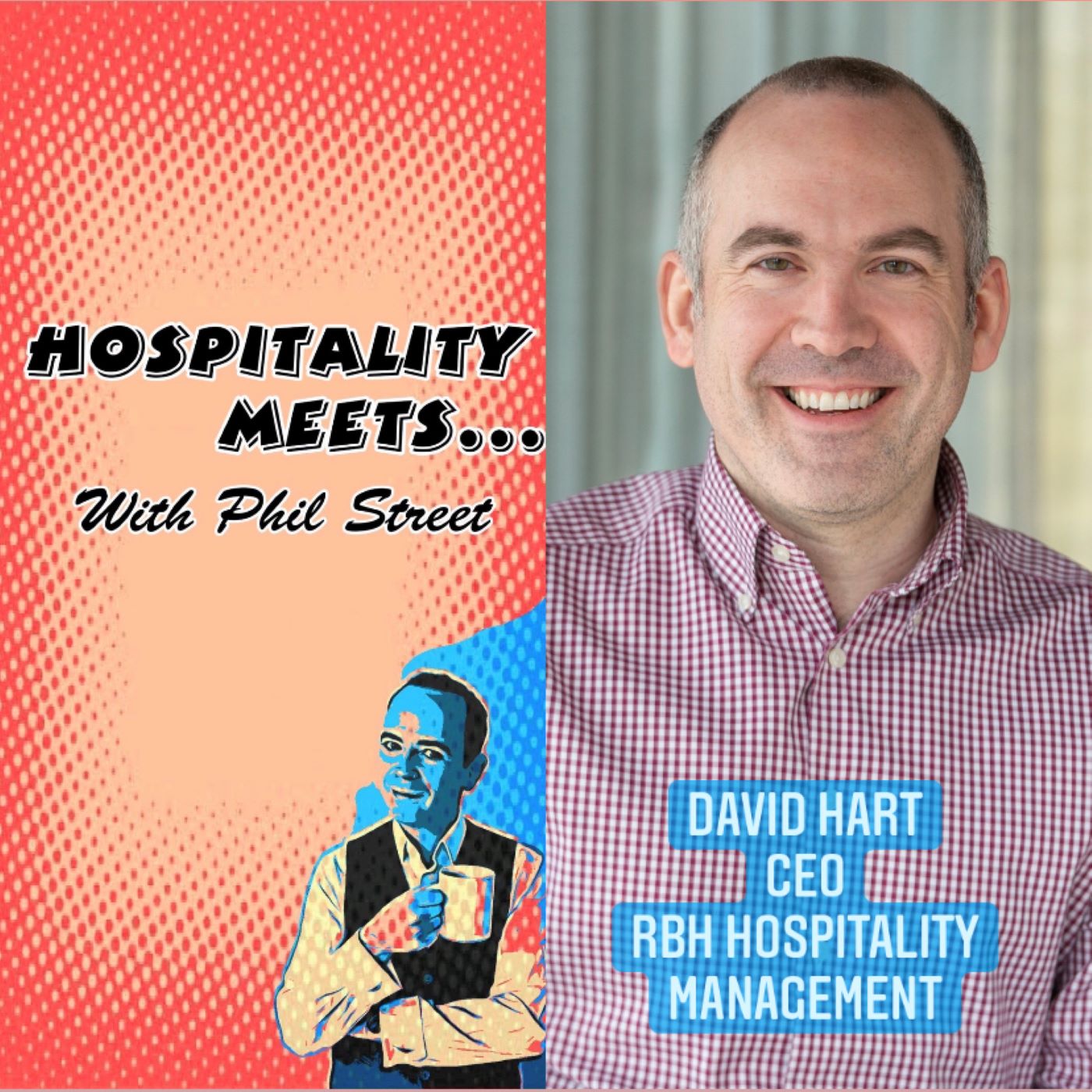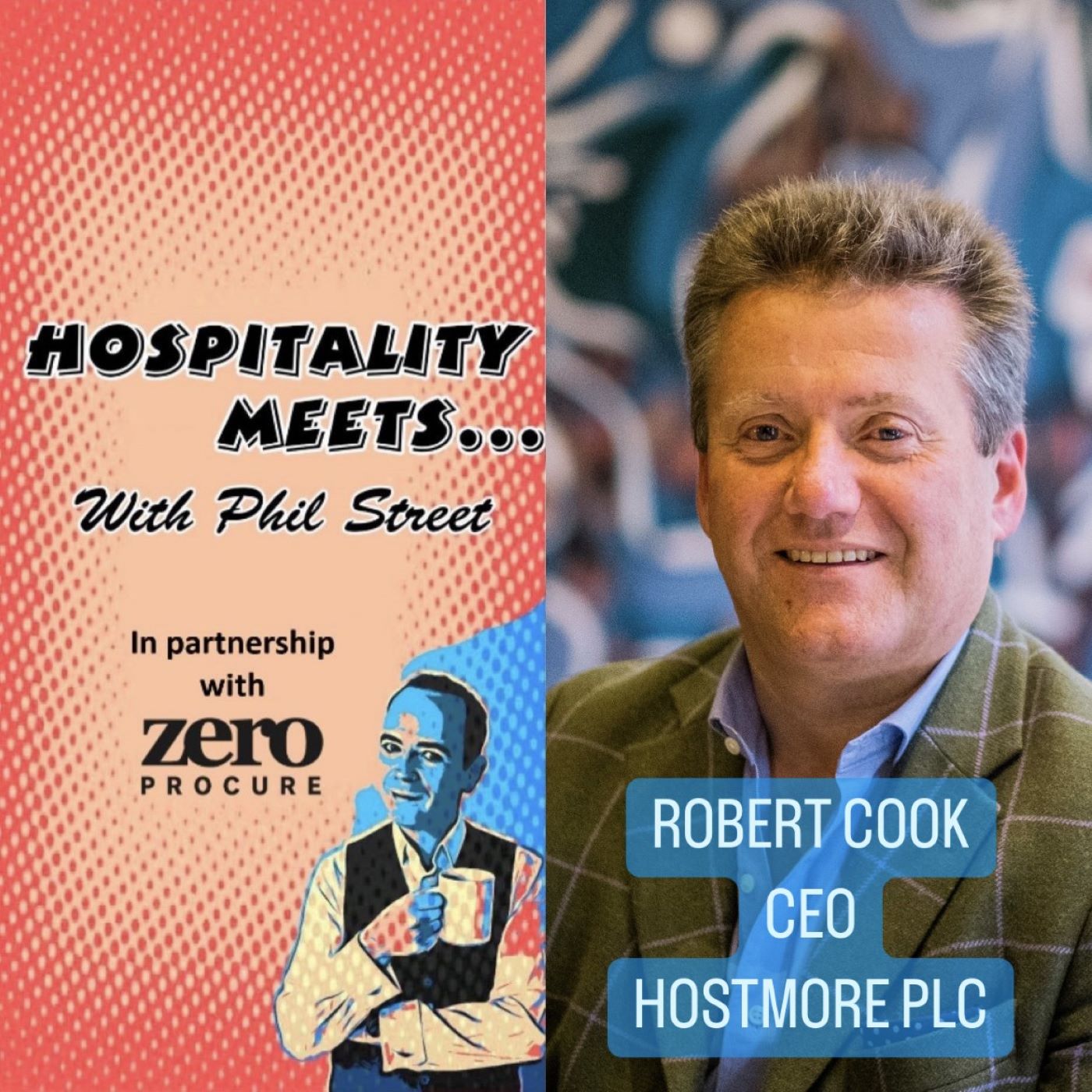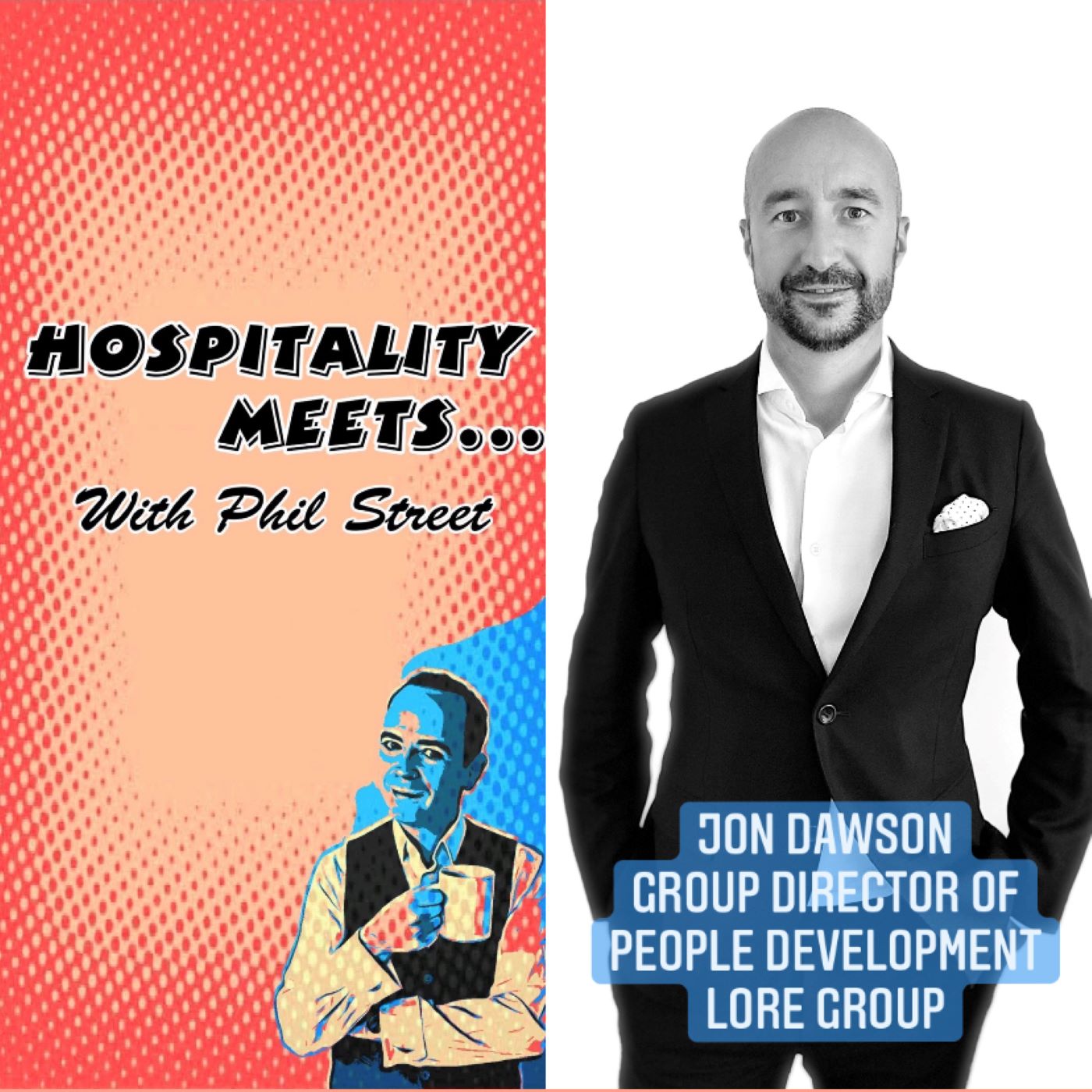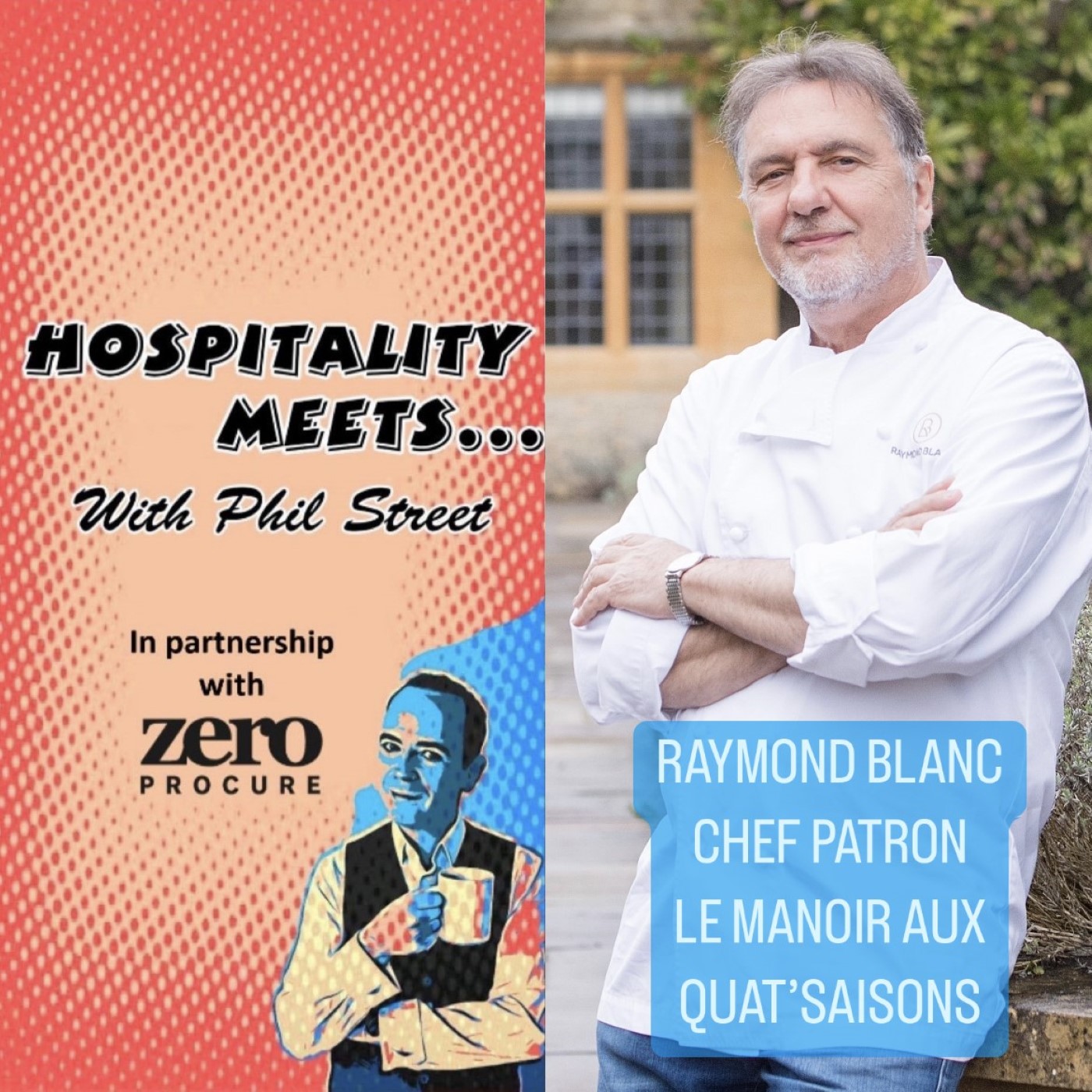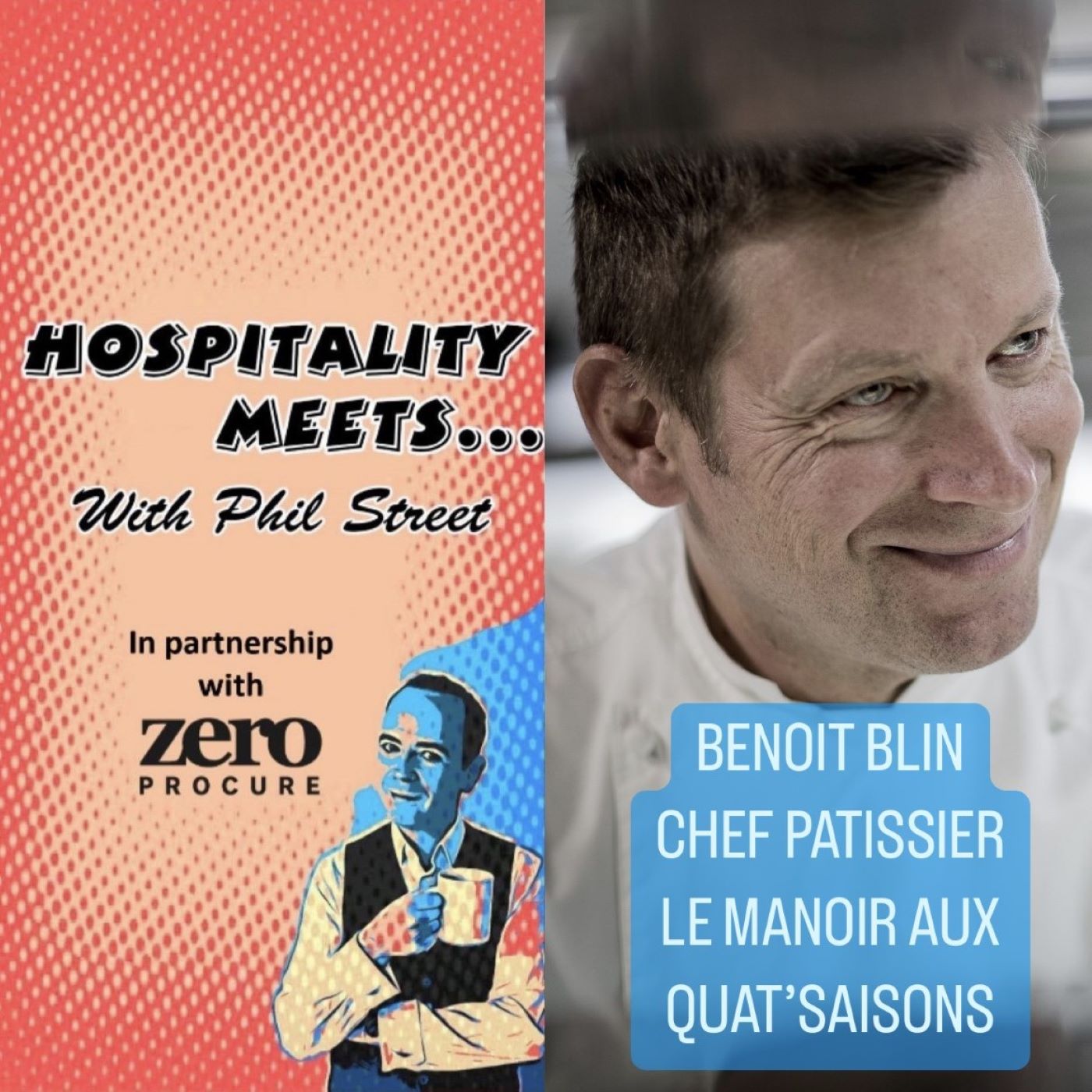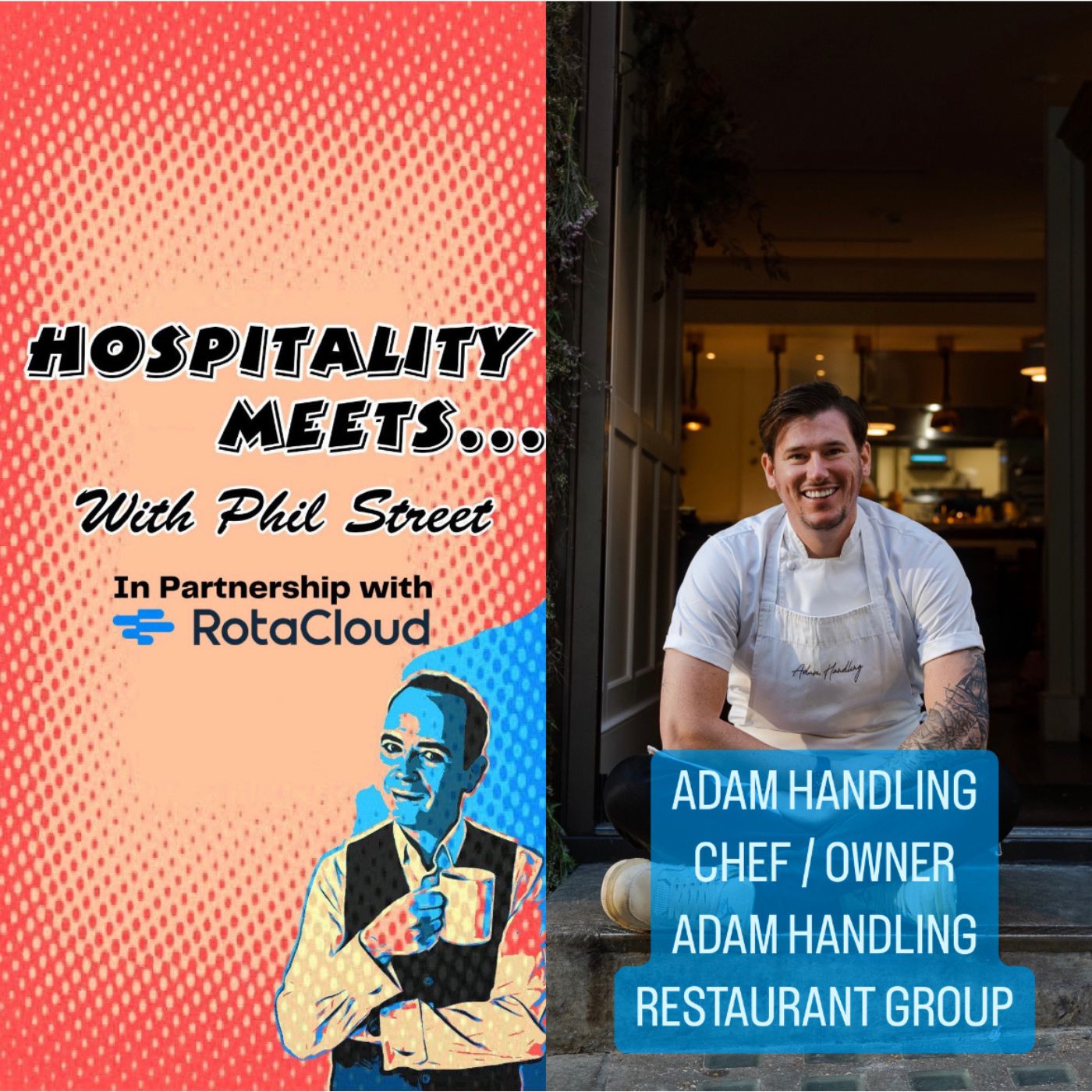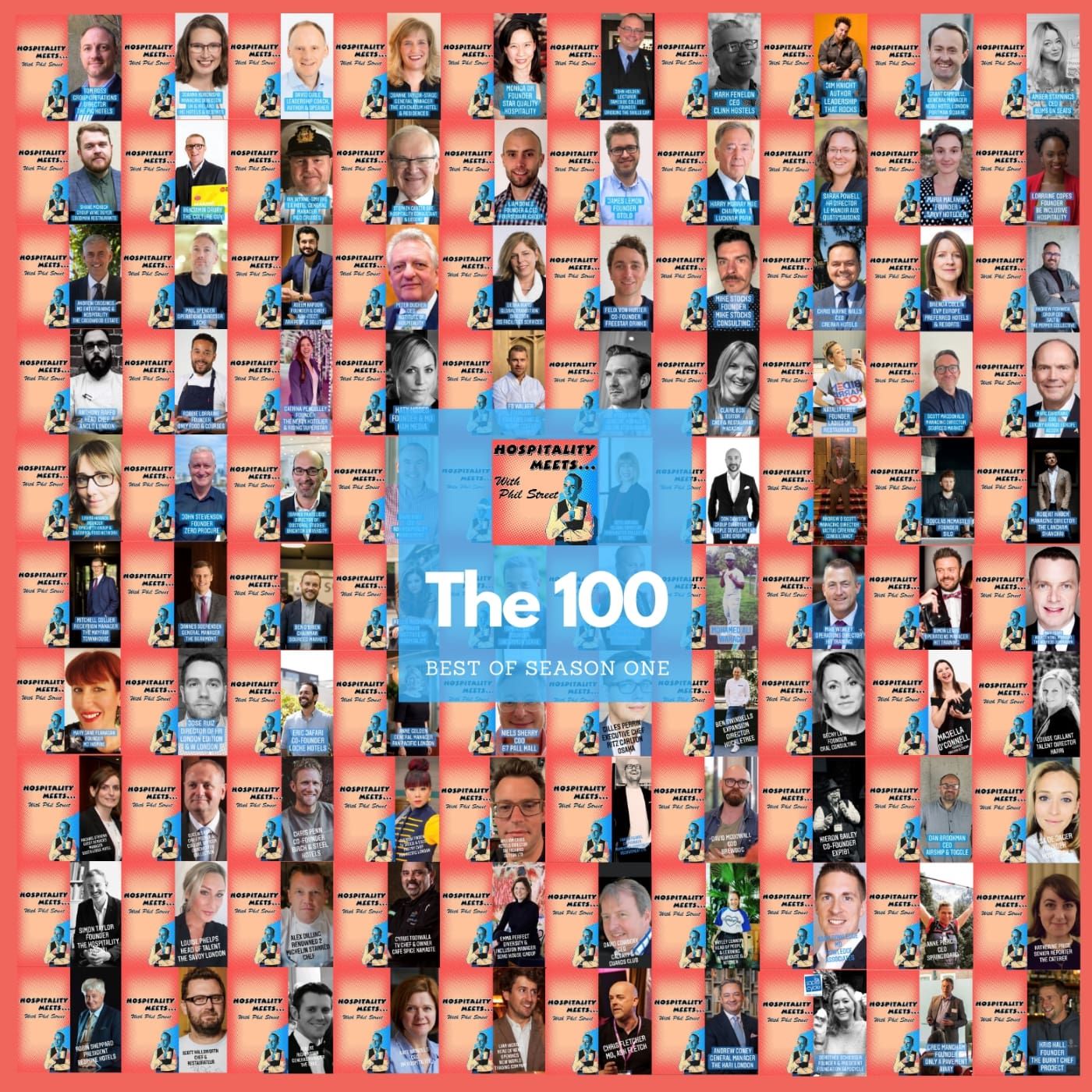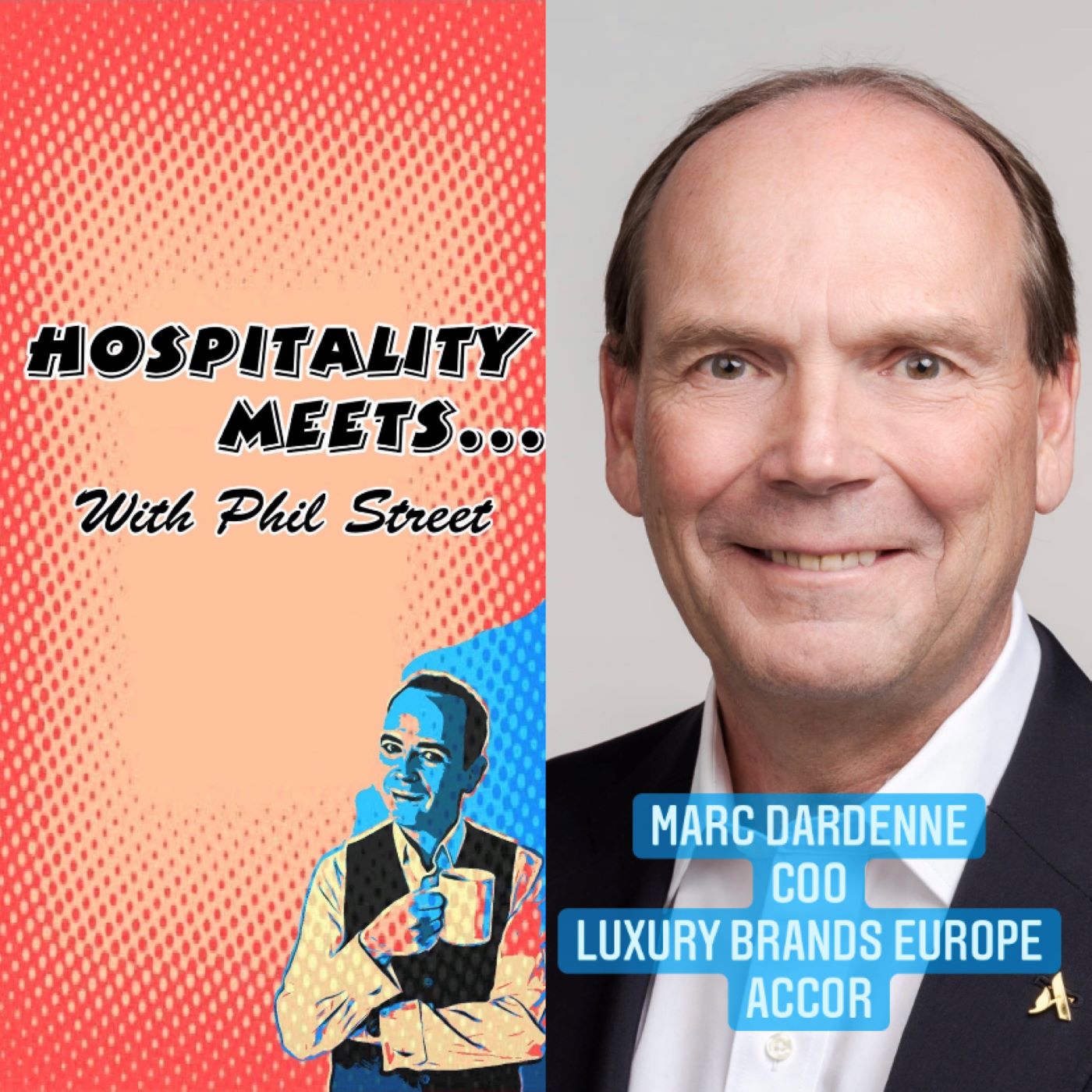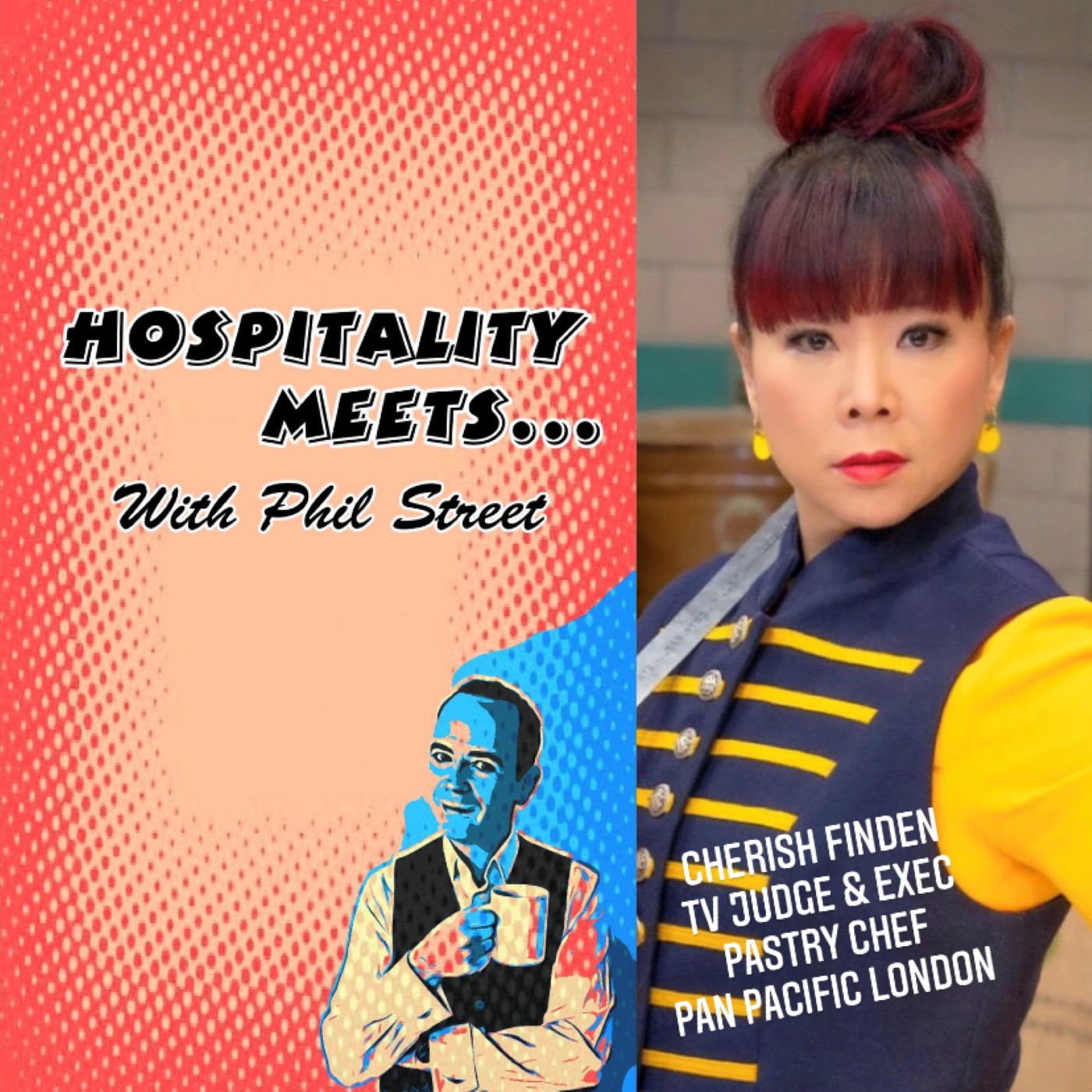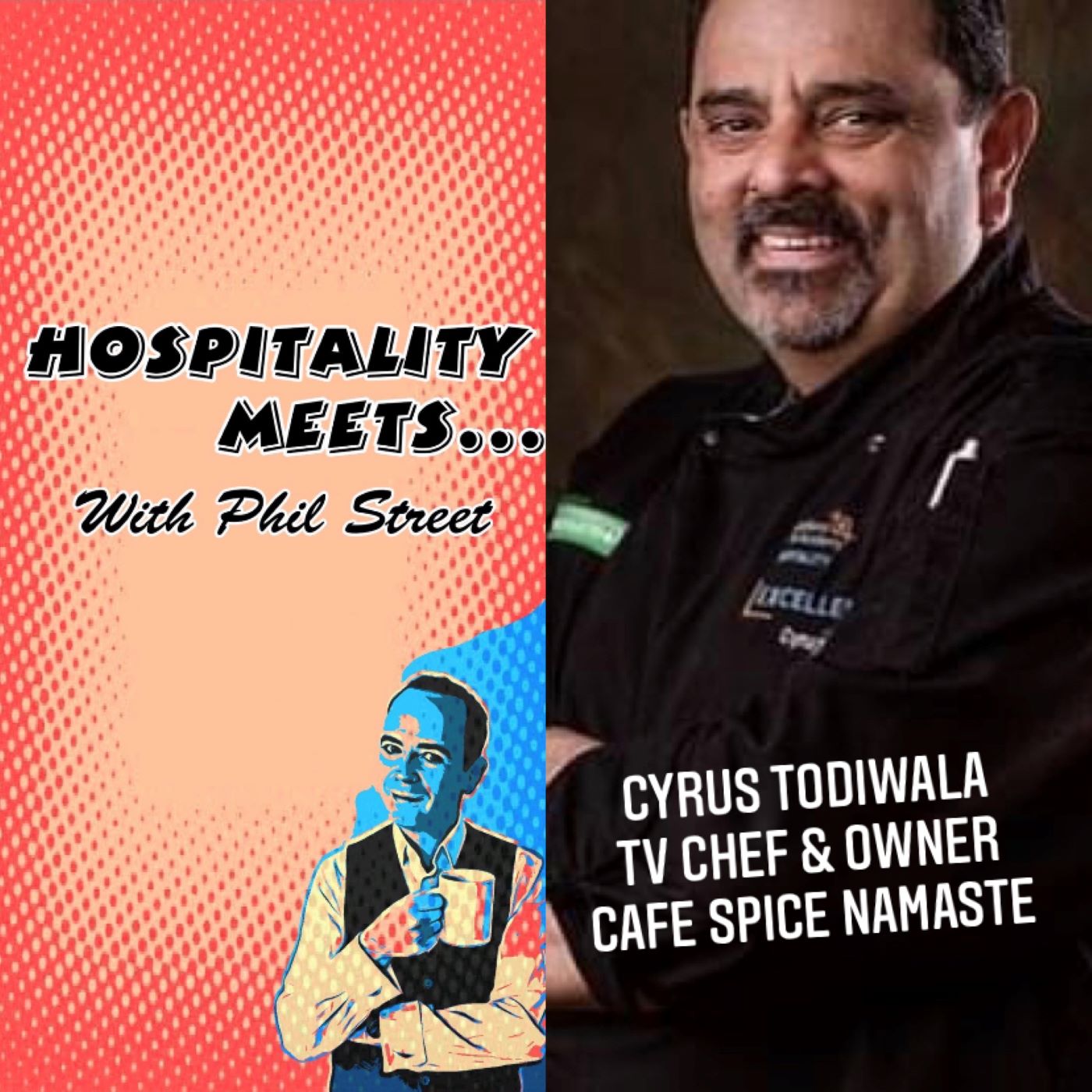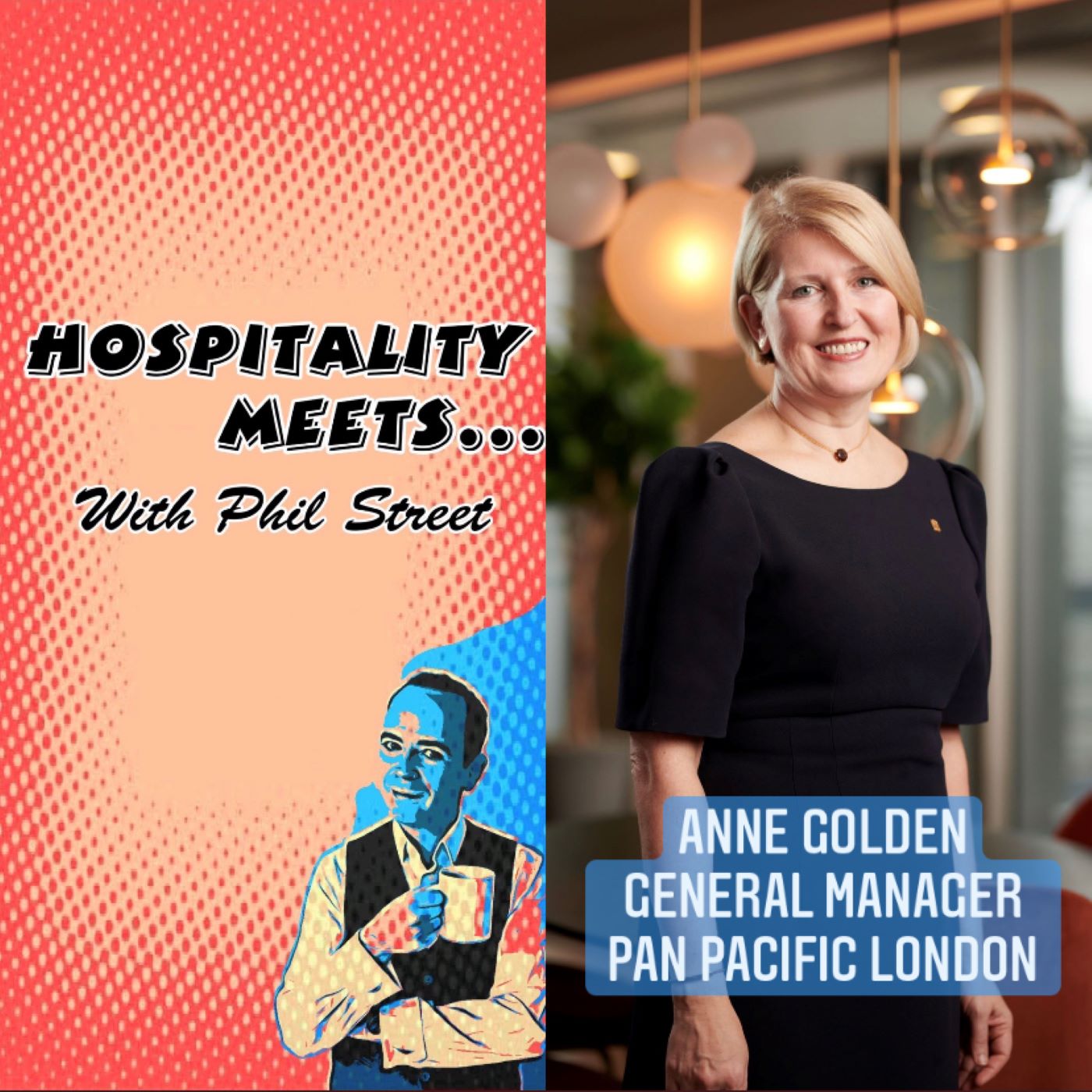Phil [00:00:00]:And a huge hospitality week's welcome to Claire Llewellyn Davis.Claire Llewellin-Davis [00:00:04]:Good morning. Thank you. Delighted to be here.Phil [00:00:06]:How are you?Claire Llewellin-Davis [00:00:08]:Really well, thank you.Phil [00:00:09]:Good stuff. Yes. Are you. Where are you? Are you actually. Well, actually, before I get into where are you? Just tell the world who you are and what you do.Claire Llewellin-Davis [00:00:18]:Okay. So, as you heard, my name is Claire Llewellyn Davies. I am the managing director of the beautiful Lansbury resort. This is a resort for those that don't know it or haven't heard of it. It's 25 acres that sits on the River Thames between Kingston and Twickenham. So we're just by Teddington. It's a role I came on board in 2022, July 2022. Yeah.Claire Llewellin-Davis [00:00:43]:An absolute delight to be here.Phil [00:00:44]:Yeah. And, well, we'll get into the Lensbury in a lot more detail as we get into the fullness of the discussion, because it's gone through quite the change, I think, in its lifetime. So we'll get the history around that and actually, your direction of travel later in the show. But actually, before we get into that, let's just go all the way back to the beginning. Now, I was, frankly, this is. I suppose this is the joy of doing the show, and rightly or wrongly, I hadn't heard of you before one of your people reached out to me to see if we'd be interested in having you on and a quick look at your background. And I was like, oh, yes, yes. So, yeah, before you got into hospitality, there's a bit of a career before that, by the looks of things, as well.Phil [00:01:29]:So maybe you could just kind of take us all the way back to. How did you. How did you get your start in life? What happened?Claire Llewellin-Davis [00:01:36]:Yeah, thank you. Yeah, I think it's been a life of many chapters. I'm a big believer, I think, in doing what you love and what's the saying is, what's for you won't go by you. I've always loved people. I think I'm very natural in the hospital industry, so I did languages at university, perhaps already not a natural way into hospitality. Did languages at university, went to live in Japan for a year, then I went into the city for a couple of years.Phil [00:02:02]:What's the objective by studying languages? This is quite an interesting one, actually, in terms of. You go to do that for what purpose? What is the goal at that time of your life?Claire Llewellin-Davis [00:02:12]:I think not knowing, perhaps at the time, exactly what I want to do. I think languages keeps all doors open, you know, I think it's the joy of a language, I always feel, is you get to understand another culture from the inside, if you like. And we think that's a real privilege. And for me, choosing languages, again, it was a natural course from school and it kept many doors open so I could still go in many different directions, not being entirely sure at that time kind of what that direction was.Phil [00:02:43]:Yeah.Claire Llewellin-Davis [00:02:44]:And also, it also was a four year degree course with a year out in France and Germany. So that has to be attractive.Phil [00:02:55]:Yeah. So sorry I cut you off. You went off to Japan.Claire Llewellin-Davis [00:02:59]:So I went off to Japan, did an incredible year in Japan, working for the japanese exchange and teaching program for the japanese embassy out there. And then I came back and thought I was missing out on this great career in the city. So I went to work for a big global law firm using my languages, which. Which was really nice for link notice, as it was at the time. And then I. So I was in the officer training Corps, a CCF at school and officer training corps at university. And I was invited to a ball over in Germany while I was working in London. And I learned at that point that the age for officers had gone up from 25 to 29.Claire Llewellin-Davis [00:03:36]:And I was just on the cusp of coming up. So I think I was about 24 at the time. And just, I guess an alarm went off in my head and thought, right, that's my calling. I really see, I did. So, as I said, I did OTC at university. So with that, I came back and I went to the careers office on the Strand, and they weren't quite sure what to do with me. And they said, right, okay, well, if you're serious about this, then we will send you to go on the. You have to go on a three day assessment center.Claire Llewellin-Davis [00:04:06]:So within a week, I was lined up to go to the assessment center, went to the assessment center, and they were like, green light to go. We're ready to take you to Santa. So it's like a very quick decision and a quick switch from being in the city to going to Santa.Phil [00:04:20]:Oh, half, yes.Claire Llewellin-Davis [00:04:24]:So I was kind of, I suppose, one of the first intake of being slightly older, I guess. And Santos is brilliant, but I guess when you're a little bit older, you are already a little bit. You're who you are. And I think maybe there's a slight kind of, we're going to rebuild you and make you who we want you to be. So I think it's just learning to play the game a little bit, if you like, you know, through that year at Sandhurst. But, yeah, but what a year it was.Phil [00:04:49]:That's very interesting, actually, because that's a really good point you make around. You know, I suppose the older you get, the more, I don't want to say, stuck in the ways. Stuck in your ways you get. But certainly you, as you say, you're beginning to know who you are and you're beginning to understand your identity. And if their process is, is that effectively, you know, everyone starts on a level playing field, I would imagine, and you've got to park everything at the door and get stripped right back and. But I suppose you've then also got the maturity to understand that, well, I just need to. I need to do what I need to do to ensure that I pass and I move forward.Claire Llewellin-Davis [00:05:29]:Exactly that. And unfortunately, we had a couple of officers that have come through the ranks, officer cadets that come through the ranks, and they are brilliant, absolutely brilliant to be able to come through the ranks and go to some sandhurst. And we were like, a few of us were slightly older. Like, is the army really like this? No, this is just Sandhurst. This is just to make sure that you're coming out and you're thoroughly tested in every which way. But don't worry, the regular army isn't like this. It's actually really enjoyable. So it's like, right.Claire Llewellin-Davis [00:05:57]:We take that with a bit of faith. And as you say, you kind of just, with your experience, just kind of play the game and do what you need to do to get through that year. Yeah, it was an incredible year. And I think what the military gives, it gives you many skills. But, you know, I didn't know I could stay awake for 56 hours. You know, that's something I learned from Santos. It's not something I may perhaps need in my life. But, you know, when I'm working long hours, I can say to myself, well, Claire, come on, remember those days back in the beach? Remember that sleep deprivation exercise?Phil [00:06:29]:My life? Yeah. So describe that then, in terms of that. Sorry, I'm just going to hone in on this, because one, as somebody who loves you, sleep more than probably anything else in the world, sleep deprivation is something that I know that I don't. I definitely don't operate at my optimum if I'm not in my routine. So what happens to you in the moments when you're. You're at hour 55 of this 56 hours stint?Claire Llewellin-Davis [00:06:58]:Well, that particular exercise is kind of infamous. There are a series of kind of different exercises you have to kind of get through. Through Sandhurst. And they all kind of test different things. In this particular exercise, you basically had to dig a trench and then you go into like an NBC attack. So you'll then have to. You're in this trench, you're digging this trench. You then get attacked.Claire Llewellin-Davis [00:07:18]:So everybody's kind of in their dog trenches. You then get attacked. So there's firefights and then they do an NBC phase. So that's a nuclear, biological, chemical phase. You then have to put on your NBC gear and your gas mask and then you have to. We had to leave the exercise in our kit, so you are absolutely exhausted. And then you have to march out in your NBC kit, which is hot and heavy and you're tired and it's just an absolute test of your mettle and, you know, what, what you can endure. So I guess they keep you going because constantly things are thrown at you.Claire Llewellin-Davis [00:07:50]:So it's, I guess adrenaline kicks in and, you know, you dig deep and see your way through that. But, yeah, we were hallucinating, you know, at the end, I'm not sure we would have been in a great state to have a proper full blown attack, but you learn a lot through that kind of, that kind of thing. And I guess that's, that's the idea of Santos, is just to make sure that, you know, the toughest of circumstances that you've got what it takes to see you and your men through. You know, I think in another similar kind of memorable exercise that I've drawn on. So that's the NBC. So you have to be able to put your gas mask on in a gas attack, you know. And one of the exercises they would do is they would put us in a gas chamber. That sounds really bad.Claire Llewellin-Davis [00:08:36]:It's basically tear gas. And you had to, we had to take our gas mask off and put it around, you know, turn it, take it, put it around your head and put it back on again. And you cannot panic because if you panic, then you'll take a gasp of tear gas. And obviously that, you know, that's basically the end of that exercise because, you know, you're not then in a fit state. So you just have to stay very, very calm and remember to kind of twist your gas mask back on and. And you'll be fine. But it's a proper just learning to stay calm under pressure. And, you know, I wonder if later life, I kind of draw on that even subconsciously.Claire Llewellin-Davis [00:09:15]:It's like, just remember when the going gets tough, you've just got to stay very, very calm.Phil [00:09:19]:Remember where you have been before and what your kids remember.Claire Llewellin-Davis [00:09:22]:Where you have been and draw those, draw on those experiences.Phil [00:09:26]:Yeah. I always remember some of the advertising around when the army were advertising to take people on and they do these really cool adverts. And then there's a tagline at the end that something like that. It's a state of mind, you might have it. And I always remember watching that particular advert going, I absolutely don't. I don't have that thing. But then you think to yourself, well, nobody really truly knows what they're capable of until they're pushed. Right.Phil [00:09:55]:And actually, we probably all surprise ourselves with what we're capable of completely.Claire Llewellin-Davis [00:10:01]:And I think, you know, in normal day to day life, when do you get that opportunity to really push yourself and see, right, what am I made of? You know, normally we don't, you know, maybe elite athletes, you know, they get to that point and they can really see, you know, what they're made of, but normally we don't. And I suppose that purpose of scientists is put you into these very, very extreme conditions. So, you know, you've been tested and with that, you get so much confidence kind of in life and going forward. And that's why I think the military is such a, such a great grounding for kind of future, future success, if you like, because you, you come out of that a very confident person and kind of ready to take on the world, you know, you feel you can do a lot. So that stands us in good stead going forward.Phil [00:10:50]:Yeah. Yeah, absolutely. So how did your career map out within the army then?Claire Llewellin-Davis [00:10:55]:Yeah, I loved it. So I did eight years in the army. I was deployed to Iraq and Afghanistan in my time. Both very, very interesting times to be out there, I guess. Afghanistan was protected. Six and a half months out in Afghanistan, that was an experience. I went out kind of to manage the supply chain. So regaining control of all the supplies out in the theater, I guess, because so much was coming in so quickly, I ended up then my.Claire Llewellin-Davis [00:11:25]:So two. So the major at that time who was running the fuel supply chain, I ended up then taking over from him. So at this point, I'd specialize in food services. I guess I'd already had a bit of a leaning towards potentially that might be my future career. So I'd specialized as a food services officer, went out to Afghanistan and ended up taking over, over as the fuel officer. But that's the military. It's like you've got one skill, you can quickly adapt to another. You need to learn quite quickly.Claire Llewellin-Davis [00:11:52]:So then ended up kind of running the fuel supply chain after Afghanistan until the next successor kind of came in and I moved on to my next role.Phil [00:12:01]:Yeah, I'm already seeing quite a lot of similarities, actually, in terms of the army structure versus a hospitality structure, in terms of that adaptability that you need to have. And actually, I talk about this not just on podcasts and things, but generally with anybody that I come into contact with that wants to enter into a chat is that I've believed for a very long time that we are very, very quick to define people by the jobs that they do. But in actual fact, that's really, really dangerous because you then get self defined as to, that's who I am. But the minute that's taken away from you, if you don't feel that you can do anything else, it's quite a dangerous state of mind to get into. And I kind of comes back to your point around. I suppose the tests that you're put through in these moments of training don't really do you justice as to what you're fully capable of. And it's the same principle. And here you are in the army having done a job, and then you just literally transition into another job because, one, you probably don't have a choice, you just have to do it.Phil [00:13:11]:And two, you just kind of go, well, let's just crack on. Let's get on with it.Claire Llewellin-Davis [00:13:15]:Yeah, completely. And I think attitude is key and I think that's so true in later life. And, you know, I think when I'm recruiting for roles, it doesn't matter if you don't have exactly the right skill set, unless it's a very, very specific skill set that you need. For me coming in, I'm always very open minded. When I look at people and I look at their cv's, I think, actually, what have you got that's transferable? And within those first kind of 30 seconds to a minute think, yeah, you're the kind of person that will be right for this role. And yes, we can bring you up to speed on this area or that area, but it's that willingness to learn, isn't it? And it's that attitude that's everything for me, certainly.Phil [00:13:53]:Yeah, totally agree. Yeah. So, yeah, I suppose bring us home from your army time. How did. When did it start to become, I suppose a moment in your mind where you were thinking, I'm going to have to start looking at. At something else.Claire Llewellin-Davis [00:14:10]:Yeah. Yeah. So I absolutely love my time. So after Afghanistan, then I went to go and be the adjutant of a unit over in Germany, and at that point, I was a very senior captain. I was about to promote to major and I was about to reach what we call this kind of pension trap. And that's where you do your major's exams. And then you're going to be in for another eight years because you're going to get your full pension. And that's a kind of normal.Claire Llewellin-Davis [00:14:30]:So I left it quite late until this point because I was really enjoying it. And I thought actually I'm not prepared to commit another eight years of my life. And actually I think I've got, you know, other areas I want to have a look at. So I left quite unusual, I guess, as a very senior captain. And I tapped into a good friend of mine from school. Her dad used to place very, very senior military officers, you know, brigadiers, generals. And she said, well, dad would be very happy to see you. And of course I was a senior captain but way below the normal kind of people that he would play.Claire Llewellin-Davis [00:15:01]:So I went to see him. He was a lovely man. And he's like, well, I'm not really sure what to advise you but I do recommend just have a look at the Sunday Times exec appointment. I think it was literally that weekend I bought the Sunday Times and there was the job at Hurlingham, which is a beautiful private member's club. And I just. It just jumped out of the page at me and I was like, gosh, it's meant to be. So I did my research on Herleigh and thought that's the world. At that time.Claire Llewellin-Davis [00:15:30]:It was a membership and events role. And I thought, yeah, that's my background. I've got a lot to give. I did my research. Turns out that the CEO was a rear admiral. So I was like brilliant. He understands the services background and I cold called him from Germany and in hindsight he said that's just so audacious to do that. And he was blown away.Claire Llewellin-Davis [00:15:54]:He was like, nobody has contacted me. You're the first person. I was like, just, this is me. Here I am. I'd love to come and meet you. And I guess I knew at that time I would never fit the classic boxes that the recruitment agencies are going to be after. You know, I would just get put into that kind of not relevant pile. Let me just go in and call him.Claire Llewellin-Davis [00:16:13]:So I arranged to meet him and had a look around Hurlingham. Anyway, took a long story short. I ended up then my kind of next role was at Hurlingham. And that started my love then for private members clubs. And I entered the world of private members clubs. And it was like I absolutely found my calling and found my niche. And so I started in heading in 2009 and then at that time, the club Managers association of Europe was becoming a much more widely recognized body. The club certified club managers qualification is a very, very big in America, but the team in the UK doing a great job to make it a proper certified recognition here in the UK.Claire Llewellin-Davis [00:16:58]:So I got my CCM qualification and so that then did my nine years at Hurlingham. Had a brilliant time. Just felt I was ready for the next step. And my husband and I had a. Had a bit of a challenge. We said, right, who, which one of us is going to find a job overseas? And I was quite, quite determined and I saw this, this brilliant challenge I.Phil [00:17:19]:Can get on board with.Claire Llewellin-Davis [00:17:21]:We like a challenge. You're sensing that. So lo and behold, then I found a great role with the Hong Kong Jockey Club over in Hong Kong as the GM of essentially, of their national question centre. So we pulled the plug on the UK in a very lovely, safe life to take. We had a young family at the time to take the family overseas and go and have a few years of adventure.Phil [00:17:43]:Yeah. Wow. Well, before we get stuck into that chapter, I'm going to just rewind you one. I think it's wonderful that you've kind of highlighted that boldness of picking up the phone. Right. Because this is something that I'm also a benefactor of, you know, luck or whatever it is. But you kind of. I was.Phil [00:18:05]:I remember way back at the beginning of my career being so nervous to call an HR department about anything because, you know, 20 years old, no real, you know, amazing life experience or whatever, but I really, really wanted a job on a cruise ship. I was kind of really single mindedly focused around that and everybody had told me, you're going to really struggle because they, you know, they need to see x amount of experience and all of that kind of stuff. And I. So I just had. I think it was actually my dad that said to me, you've got to then figure out what your unique selling point is going to be. And who'd have thought that actually picking up the phone and entering into a conversation with somebody would be the unique selling point? And was lucky enough to get put through to the head of HR for the whole of P and O cruises. And two days we just had a half hour chat about life. It wasn't even really an interview.Phil [00:18:59]:And two days later I got an invite to a formal interview and then went through the formal interview process and got the job and I always highlight that in my own story as a really, really pivotal moment. Is that, yes, it was uncomfortable for me to do that in that moment. But think of the choice if you don't do that and highlighting that in your own journey as well, I think is I also love the fact that that's a real. This happens so often in all the conversations that I have on this show. Such a sliding doors moment, isn't it? That you pick up that particular edition of the Sunday Times and if that job's not there, you're, you know, completely.Claire Llewellin-Davis [00:19:40]:You know, you make your own luck. I'm a believer in that. But it's, you know, there's a little bit of help there somewhere, isn't there? It's like the stars aligned. And had I not, you know, had I not met my friend's dad, you know, who. Who knows what I'd be doing? I'm sure I'd probably end up in hospitality because I think it's natural calling. But yeah. Yeah, very, very interesting. And it was interesting with that.Claire Llewellin-Davis [00:20:02]:So I was then kind of trying to keep the recruitment agency informed as well because I don't want to upset them because they could be useful in later life. So it's like, you know, then kind of trying to juggle going directly and just keeping them abreast of what's happening. They're like, yeah, this is, this is, you know, it's a little bit unorthodox. It's like, yeah, you know, sorry about that. But, you know, it's competitive. It's a competitive market, isn't it?Phil [00:20:21]:Yeah, you know. Yeah, absolutely. The other thing that I just wanted to, and this comes from your notes, actually is that you had a wonderful story from your time at the Hurlingham Club. If you're prepared to share that one.Claire Llewellin-Davis [00:20:33]:Oh, so I loved. I love Hurlingham and I think I probably still bleed a little bit of Hurlingham. But. So I was running the events there and, you know, I guess back to the military days. It's kind of be the best and such a premium, beautiful private member's club. It's like, right. I really want to just put some brilliant, brilliant events on there and bring in some very, very high profile speakers where I kind of ran a series of speak of the years. And one of the events that I did was, again, I was reading the times.Claire Llewellin-Davis [00:21:02]:There's a bit of a theme here. And there was a really good article about Cherie Blair's foundation for women. I thought, gosh, actually, people may be undecided about her but what a brilliant. You know, she just. She's such a brilliant lady and what a great speaker she would be. So I ran it by the. The chief executive time and the chairman of the club and the chairman of House. There's lots of committees at Hurlingham just to make sure everybody was on board.Claire Llewellin-Davis [00:21:28]:And I reached out to her chambers. She said she'd be delighted to come. She was like, fantastic. You know, what a fantastic speaker for us. And I thought, well, she could touch on the Downing street years and then, you know, talk about her foundation for women and we'd raise money for her charity. And it's, you know, be a really good, really interesting evening for the Herlian members. I hadn't realized. I clearly stepped on a bit of a landmine there.Claire Llewellin-Davis [00:21:51]:And there was absolute uproar about. I think she was of a different political persuasion shall we say to a traditional speaker at Hurlingham. And my poor CEO at the time got lots of complaint letters in and I had my usual marketing around the club and there were calls for protests to be on the night of the event. She was there. Oh my goodness, what have I done? My chairman of house was like, Claire, Claire, are you sure about this? But the chairman of the club, he was like Claire, this is brilliant. You have Shaker and Hurlingham to its core. This is brilliant. You know, you've really given us something to think about and talk about.Claire Llewellin-Davis [00:22:30]:And it's absolutely fantastic. And he was wholeheartedly behind, behind this event. Of course when we put the tickets on sale, sold out within two days. It's like, well, that says everything. I just had to hope that it was the right people coming for the right reasons. But she had her private security and so we, you know, we were. I obviously had my invention background. It's like, right, we have security on at the event.Claire Llewellin-Davis [00:22:50]:We're doing bag searches. We make sure we've got a quick getaway. We've got an exit route for her. You know, in case it goes a little bit unsavory. But this is herleam so it's not going to go fatten.Phil [00:22:59]:So it could be verbally unsavory but I would. But probably not physically. But who knows, right? I mean, who knows?Claire Llewellin-Davis [00:23:07]:We had all options covered.Phil [00:23:08]:I.Claire Llewellin-Davis [00:23:10]:And she came in and she was absolutely brilliant. So her first slide. So we've got a bit of media interest at this stage. The Daily Mail loved Hurlingham and there were quite a couple of kind of unsavory headlines that we popped.Phil [00:23:25]:Yeah, you sent me the articles, actually. This is remarkable. Remarkable.Claire Llewellin-Davis [00:23:30]:Unbelievable. And her first slide, she put up some of these headlines and just spoke to them and she had everybody roaring with laughter. And she won that crowd over. And it was one of the highlights of the year. And she was brilliant. And for me, the best bit is the chairman of house. He'd been a little bit. He'd gone.Claire Llewellin-Davis [00:23:50]:We've been. He'd been supportive, but he wasn't like, I'm not. I'm not a huge fan. So. So were the seating plans. Of course, I didn't put him next to her.Phil [00:23:57]:Yeah.Claire Llewellin-Davis [00:23:57]:And then after. After the dinner, then. Sorry, after the speech, I went through to the table and seen that the seating plan had mysteriously been changed. I said, oh, my goodness, he's next to her. And he came up rather coyly and said, claire, claire, I'm really sorry about that. That was me. I've changed the seating plan. I think I've fallen a little bit in love with her.Claire Llewellin-Davis [00:24:16]:And that is just the biggest praise I could have heard.Phil [00:24:20]:Totally.Claire Llewellin-Davis [00:24:21]:A brilliant evening.Phil [00:24:23]:What a marvelous story. What a marvelous story as well, because, I mean, there's so much to unpack it out, which we won't do on this show, but even just the concept of the people need to get out the way of their own perceptions of stuff. Right. I mean, it's like. And who would, you know, of all of the people in the world, you would expect that she. She must come up against that kind of stuff all the time so she'd be well prepared for it.Claire Llewellin-Davis [00:24:49]:Barrister, isn't she? I mean, she's. You know, if anybody can talk to a difficult audience, she. She absolutely showed that. Showed that in space, you know, she was brilliant. And she. Yeah, she worked that audience, you know, respect to her. It was. It was a fantastic evening.Claire Llewellin-Davis [00:25:05]:A memorable evening.Phil [00:25:06]:Yeah. I love stories like that. I really do. I think they're also what give this industry so much of its color. Right. I mean, you. You do something with amazingly positive intention and who the thought that you get this ferrari around, you know?Claire Llewellin-Davis [00:25:22]:Absolutely. And I wasn't expecting it to be headlines on national papers, like, oh, okay. But they were very supportive, you know, and it just shows the power of having the support of. Well, if you're kind of the senior management at the time behind you, it's like they were unwavering in their support. It's like, right, we've got this, you know, we're a team.Phil [00:25:41]:Yeah, absolutely. What's the phrase? Any publicity is good publicity.Claire Llewellin-Davis [00:25:46]:So I'm not sure. Yeah.Phil [00:25:52]:Yeah. Excellent. Right, so now you're off to Hong Kong. And notwithstanding one of the most internationally recognizable club names, I think that probably exists. I'm trying to think of any others that might trump. It's definitely up there for sure, I'd say, as being one of the highest profile, well known clubs in the world.Claire Llewellin-Davis [00:26:15]:What an extraordinary organisation the Hong Kong Jockey Club is and what it does for Hong Kong and the support it gives to Hong Kong and to the government. It's an organization like no other and a privilege to be a part of. And in terms of their kind of, you know, I was a very small cog in a very, very big wheel out there, but in terms of the support and the leadership training and the opportunities that they give their staff, it was an incredible, an incredible experience. Unfortunately, Hong Kong at the time was going through quite a difficult period. And I was there at the time of the started writings, and there was the change of the kind of judicial law with Carrie Lam and some of my team got involved in some of the writing. And we just felt for us, with the young family and my husband, you know, we were in the. We were closer to China, so we weren't on. We're in the new territories, we weren't on the main island, so a little bit hard for my husband to find work, so we just felt for us as a family, we love being in Asia, but perhaps there was a, maybe a slightly more suitable environment for us at the time.Claire Llewellin-Davis [00:27:20]:So I was lucky enough then to get a job over in Singapore, working for the dutch club over there. So then we decided then to hop across, over to Singapore and carry on our asian adventure. I think, you know, once you've extracted yourself from the UK as a family, that's a big deal. Very hard to kind of, or been a bit of a shame as well. I suppose you've come straight back. So, actually, let's carry on the adventure for traveling. And so Singapore, what a very, very different experience that was. What a.Claire Llewellin-Davis [00:27:50]:An amazing region and just so beautifully, beautifully managed. I don't know if you've been over to Singapore.Phil [00:27:59]:Two of those places you've just mentioned were two of my favorite places to go when I was working on ships because they're just so otherworldly. I found from my experience of, you know, being in the UK and everything's lovely and understated, and then you go to places like Hong Kong and they're just in your face. And Singapore is just beautifully immaculate and.Claire Llewellin-Davis [00:28:24]:Easy living. We found Hong Kong very, very culturally rich and then Singapore, very, very easy living. As a western european family, nobody spoke English. Everybody has helpers as a young family, so godsend both of us trying to work as well. So, yeah, hopped over to Singapore 2019, full of excitement. And then, of course, Covid hit. It's like, gosh, what a time and what an experience then. So trying to manage the club through Covid, and, of course, the nature of that particular club is very, very transient.Claire Llewellin-Davis [00:28:58]:So, of course, when you've got people can't come in and can't leave, you know, that membership then is very, very challenged kind of upkeep. So, you know, a lot learned through trying to keep that club afloat through Singapore during COVID And how.Phil [00:29:11]:And how was it in. How was. How was Covid managed in Singapore?Claire Llewellin-Davis [00:29:16]:Extremely tightly, I think is fair to say.Phil [00:29:19]:That doesn't surprise me. It doesn't surprise me, yes. A lot of laws there, haven't they?Claire Llewellin-Davis [00:29:26]:We were very, very well controlled. And I think that the difference there is, as an expert working in Singapore, you are the. You have to have your visa to work there, so you have to have your right to work. And essentially, the government has got control over you because of your right to work. So, of course, if you misbehave, you lose your right to work, so they send you home, so they've got this kind of grip on you. But it felt, to be honest, it felt very, very safe. We felt very well looked after. Yes, it was quite safe.Claire Llewellin-Davis [00:29:53]:Distancing regulations during COVID was quite challenging to manage. So we kind of went, you know, had two people to a table or four people to a table, and so many meters between guests and trying to run the pool, trying to run the sun lounges, people to wear masks beside the pool. You know, some of the measures were quite draconian, but then we did feel safe. And when we looked at the UK, the UK looked very naughty by comparison, in terms of what was happening in kingdom, we felt extremely.Phil [00:30:21]:Well, that's Boris Johnson for you, isn't it? Yeah, but isn't it funny, though, again, here we are, different perceptions, right? Because I'm guessing us here in the UK, we were probably thinking, well, this is so bloody frustrating, but in actual facts, it sounds like we had it.Claire Llewellin-Davis [00:30:41]:All right, actually, it's the lens you look through, isn't it? So true of life, isn't it? From our particular lens, where we were very, very well looked after and very controlled, we knew exactly what we could do and where we could go and how we could go and look at the UK. And it just seemed it was still so free and with. At that time, I guess because of COVID you know, a little bit unsafe, I guess.Phil [00:31:06]:Yeah, absolutely. Well, plus, talk about, I suppose, the specificity of having very clear guidelines and sets of rules. I think that was probably something that the UK didn't have. I mean, you know, who remembers the tiering system, right? And who can still fully decipher that it was. There were rules in play, but they were loose and very much open to interpretation, I think.Claire Llewellin-Davis [00:31:31]:Okay. There was none of that in the same war. It was black and white. We knew exactly what we couldn't, couldn't do. Absolutely, yeah. Very controlled. So, yeah, again, another kind of. If you were going to be stuck in anywhere during COVID actually, Singapore wasn't a bad place to be, you know, and I think we had about five weeks of being kind of intensely locked down where we couldn't leave the house, apart from maybe one person could go and get some food or maybe go for a run or a walk.Claire Llewellin-Davis [00:31:57]:And so we had a little paddling pool. It's like we couldn't get access to our pool at the time, so we had a little paddling pool and we had a little bit of concrete in front of the house. So it was like, well, there you are. That's the kids pool. And we just kind of made do, you know, and made the best of it. And we have quite happy memories of that time, albeit I was quite busy at work because we were trying to retain members as fast as we could, you know.Phil [00:32:19]:Yeah, yeah. But once again, speaks to that adaptability of us, right? I mean, nobody can plan something like that and how you respond to something like that. A lot of how we were behaving in that time was completely reactive to what was happening to us or whatever. And like you say, I remember the first day of we were going to be locked down. I remember being a little bit excited, and I'm really almost ashamed to say that out loud, but because I thought to myself, well, this is new, like, what do we do? You know? This is actually my. The first thing that kicked into my head was, oh, the business challenge. I'm going to get some learning out of this. This is amazing.Phil [00:33:00]:That didn't last very long, I have to say. I think literally 24 hours later, I was like, oh, oh, my God, what's happened? But equally, it does. Especially now we can all look back at it. We can look back and go, you know, we did adapt. We had no choice, right? So you have to adapt to what's happening.Claire Llewellin-Davis [00:33:19]:You know, it's like, look at us now on teams and working from home and it's just changed. Recording virtual podcasts completely, you know, and the way that we do business and just that flexibility now to work from home, I think it's just brought us. It's hurried life on, hasn't it, at an incredible pace compared to, I think, what would have happened naturally.Phil [00:33:42]:So. Yeah, absolutely. Yeah. I think it also reminded us whether we've remembered this now, but it reminded us all what's really, really important. And I think, actually, from that perspective, it probably served a really interesting purpose. But then we've all just gotten back to getting busy again. Right, so you just adapt again and we get on with it.Claire Llewellin-Davis [00:34:03]:Yeah, yeah, that's it.Phil [00:34:05]:That's it.Claire Llewellin-Davis [00:34:05]:So true. But I think it was to that end, actually, once Covid had opened up, my. Unfortunately, I lost my mum during COVID so I couldn't get back to the UK, so that was challenging. And my husband lost his dad. So it's like, you know, there were some challenges, of course, and we couldn't get back, but then it was, you know, the opportunity to came up to come back and my mother in law at this point then wasn't, well, it's like, actually, let's remember what is important and let's come back now. Come back now to the family. So it just felt right. So as soon as.Claire Llewellin-Davis [00:34:36]:As soon as everything opened up, then my husband came back. So he came back then for. For six months and was then with his mum. And because I had a helper, because that was, you know, one of the joys of being in Singapore is, like, I could carry on working full time with the girls and. And he could come back. Yes, I think, absolutely. It was kind of remember what's important, so he's so glad he came back. And actually, then he got to spend kind of six months living with her, which he hadn't done since he was a boy.Claire Llewellin-Davis [00:34:59]:So, you know, I think to that end, that's so true.Phil [00:35:01]:Yeah, absolutely. So the Singapore journey came to a conclusion with the advent of this role that you're now in. Is that.Claire Llewellin-Davis [00:35:11]:Yeah. No, actually. So we'd made the decision to come back. I was recruiting for other roles and literally, I was like, we can't come straight back to England. Never having been to Malaysia. Malaysia was literally ten minutes away from my clubs and because everything had opened up. Right, let's go and spend four or five weeks just traveling and then we'll come back. So we sent our stuff on the ship home and we then took the opportunity as a family to go explore a bit of.Claire Llewellin-Davis [00:35:38]:A bit of Malaysia and pop back into Vietnam, and it just had a bit of adventure and then came back and it was actually, as we were on our way back then, I was approached about this role and, well, you know, it came as a very general email. I was like, okay, let's just see what it's about. And then when I heard it was Lensbury, it was like, oh, my goodness. That of all the clubs, I would love to come and be a part of this.Phil [00:36:03]:Is it really right again?Claire Llewellin-Davis [00:36:05]:It was, you know, when I was at Hurlium, you know, you haven't. You have an eye on clubs that are on the Thames, because I think they offer such a unique proposition to a lot of the other kind of city clubs. It was like, gosh. And I'd heard roughly, of Lensbury, and at the time it was under shell ownership. So then when I found out that this job was up for grabs again, reached out to the MD at the time, which I think is great, and just try and find out a little bit more about the job and, yeah, so here I am. So I was back in the UK for four weeks and then started here in July.Phil [00:36:35]:Yeah, well, there we are. And the rest is history, as they say. But I'm obviously not going to let you off the hook that easily. But, yeah, so talk to me about then, the history of the Lensbury, because it's not a property that I had on my radar until it was acquired. I can't even remember when. 567, was it?Claire Llewellin-Davis [00:36:59]:2019 by Eleanor yeah. So to Lensbury is the former Shell training and conference centre. It was built around 1920s and various extensions, conference centre added on in the 1970s. I understand it was the kind of the global headquarters for Shell and they did all of their, you know, all their employees would stay here. I think it was a bit of a value add to being a shell employee as well, that they got rights to come and use, to use Lensbury. But it was their, I guess, fall back position. I guess if something happened in central London, they did all their training and conferences through here. Shell then opened it up to members in 99 so that they had touched on membership.Claire Llewellin-Davis [00:37:44]:So there were members here, I think Ronell and I took it on. And Shell also were very, very pro sport sporting heritage with Lensbury. And I've read that, you know, the shell trainees, when they were brought on, they had to be very, very good sportsmen. They kept that very high level of sporting skill alive through their employees. They were very it was a very big community club with some great facilities and they've got incredible photos here of, I think here we used to. They used to be the pre Wimbledon qualifiers for the tennis. We've got some incredible history here with old tennis rackets throughout Lensbury, as well as some sporting legends across rugby. So had a nice relationship with the RFU.Claire Llewellin-Davis [00:38:26]:So England rugby were here as well. So when Eleanor took. Took Lensbury on in 2019, we're very, very clear that that's something we absolutely want to continue to continue at Lensbury. So the elite sports bit is just another string to the bow here. So this is. I've never been at a facility quite like this. And we are a private member's club. We have approximately 7000 members.Claire Llewellin-Davis [00:38:52]:We are a conference and training centre. We have 155 room hotel and then we have 24 tennis courts in the ground and a sports and leisure complex with a spa and indoor pools and studios. And we have two elite sports pitches. So one is a five star rated pitch, so that attracts some very, very high profile sports, men and women here. And we're fairly proud of that. So when I arrived, literally within five days of me arriving, we had. The lionesses came to stay and this was during the euros in 2022, and they stayed with us unexpectedly then, because they just did so well that we had. They ended up staying with us throughout the entire time.Claire Llewellin-Davis [00:39:34]:And then, of course, they won the euros in 22 and we ended up hosting their final party here. And that was never part of the plan because they were supposed to be moving to another venue, but it was. They were so settled here. They were so happy here. It was just such a lovely vibe and, you know, we like to call it Lucky Lensbury, but they stayed here throughout and it's just the start of a lovely relationship here and something we're very proud of at Lensbury to have these teams coming through and. Yeah. Long may that continue into the future.Phil [00:40:02]:Yeah, no doubt. And lucky Lensbury, I'm assuming your marketing team can get right on board with that message.Claire Llewellin-Davis [00:40:10]:But generally, yes, there's been a couple of upsets, you know, in the past, but generally, no, no, absolutely. You know, and I. There's nowhere quite like here where teams have got access to a pitch and a hotel and. And then, of course, you've got the Thames. So, you know, we found with all the teams coming here, there's very, very intense physical training, but then they've got the opportunity to go on the boat, certainly in the summer, and they go and they go and they play on the water. Or they can do dragon boat racing. And it's just that mindfulness bit as well, because of where we are, they have access to so many different things just within the close proximity. And then Teddington High Street, a touch of normality, is just five minutes away.Claire Llewellin-Davis [00:40:47]:So you definitely need to come, fellas. It's incredible.Phil [00:40:51]:Indeed. Had my workload not been so mental, I would have. Yeah, for sure. But no, because I think as well, the positioning of it is. I mean, you know, you can't really get much better than a water fronted position, can you? It's just. I don't know what it is, but there's just something really lovely about it.Claire Llewellin-Davis [00:41:09]:Yeah, it's magical. It's magical. And we're opposite Teddington lock here as well, so it's very big, kind of prestigious vicinity, I guess, opposite us as well, so. Yeah, it's beautiful. And opposite ham land, so it's just a really lovely. A really lovely area of kind of greater London. Yeah, we're very, very lucky.Phil [00:41:26]:Yeah. Yeah, yeah. So are you fully private or are you open to the general public in any, any form?Claire Llewellin-Davis [00:41:33]:Yeah, it's a good question. So we've just done a lot of big rebranding exercise, actually, and the tagline that we've come up is kind of openly exclusive. So yes, we are open to conference delegates to hotel guests, but obviously it's a private members club. So when the hotel guests or conference delegates stay with us, they only stay with us through the fact that they're staying with us as a conference delegate or in the hotel. So they get day used to the vicinities, otherwise you couldn't come in off the high street and come and use.Phil [00:42:02]:Yeah, got you.Claire Llewellin-Davis [00:42:03]:Yeah. At the moment. So it's, it's been quite an interesting one as we kind of look at how we marry the brand and the strategy together in terms of where we're going, because we want you to feel at home whether you are a member here or whether you're a hotel guest for a night or a couple of nights, or you're here on a training course for a week. So I think it was, you know, it was quite a. Quite an interesting exercise for us to go through to kind of just make sure that we are appealing and meeting the needs of all the different segments that we host here at Mensbury.Phil [00:42:33]:Yeah. And I suppose that's a key thing of any business, I guess, but, you know, is the evolution of who you are and what you stand for and what are you to the guests that come through the door, etc, etc. So give us an idea of what's coming next. What's, what's the, where's the evolution going for, for the Lensbury at this point in time?Claire Llewellin-Davis [00:42:53]:So first thing kind of coming in then was agreeing the strategy and where we're headed. And part of that was the members here are the bedrock of Lensbury. They're absolutely core to everything that we do. So the first thing that we've done as a hotel group is we've invested in the members lounge. So we have somewhere now it's a beautiful space. So it was a room that we weren't using very much. It's been beautifully done and it's an exclusive member's lounge. And in there they've got their own.Claire Llewellin-Davis [00:43:20]:We're very much gone down the very healthy, well being good, you know, nice, healthy salad smoothies offering. So it ties in very nicely with our kind of sporting heritage as a kind of athletic, healthy club. So that's the first kind of big development that we've done. When I first arrived, I couldn't really tell in the f and b areas where are the members and where are the hotel guests and who's here on a conference and. But now we've just given them that platform and it's like, actually, we really value. You've got your own distinct area and I think that's really powerful. So that's the first thing that we've done. We put the members first there and then we are hoping towards the end of this year, early next, that we will then do the next set of renovations.Claire Llewellin-Davis [00:44:05]:So we're looking at the wider f and B area and we'll try and do that in a similar vein to what we've done already. And then we've got the hotel room. So big, big project, big renovation plans afoot, along with, I'm hoping we will get planning any day now for paddle courts over the road. So just been working with the council on additional paddle courts and redoing the thermal suite. So kind of got day to day projects going on as well as kind of wider renovation projects afoot. So a very, very exciting time for Lensbury. And we're very clear with the team. As you know, everybody's got the.Claire Llewellin-Davis [00:44:39]:To kind of get on the bus. It's like we're on a journey and you've got to have people that it's not plain sailing. You know, we're putting in new systems, we're really taking Lensbury forward and, you know, we want everybody now, but it's got to be part of this team as we just drive Lensby forward for kind of next 510 years.Phil [00:44:54]:Yeah. God, yeah. It is exciting. I'm on board. I'm on board. Absolutely. Just a shame that I live in Essex instead of where you are. But, no, I mean, it also sounds a little bit like kind of all roads have led you here.Phil [00:45:12]:Like you almost. You were almost destined to be here at this time doing this thing.Claire Llewellin-Davis [00:45:17]:Yeah, it does feel a little bit like that, actually. When I talk to people about the role, they're like, oh, my goodness, there couldn't be a better job for you. Maybe you're right. You know, I've learned a huge amount. I come from a traditional kind of equity members club background and of course, here with the elite sports and the hotel guests and conference centre, there's an awful lot to learn and it's a commercial club, it's not an equity club. So it's been a steep learning curve and I think having a brilliant time with a brilliant team around me to kind of, you know, we kind of leverage off each other to try and take lends before it is, yeah, really powerful. But, yeah, it's been. It's challenging, it's exciting, it's rewarding.Claire Llewellin-Davis [00:45:57]:No two days of the same. You know, I think when I get home at night, you know, I think that's what I love about the hospitality industry, is that here there's an awful lot going anyway, because everything that we're doing, but just in the hospitality industry generally, it's just. No two days the same. And, you know, I get home, my husband works in finance. I think he kind of wants to live vicariously through what's happening through my job, because it's so exciting.Phil [00:46:19]:Yeah, yeah, yeah, yeah. That finance boring there?Claire Llewellin-Davis [00:46:23]:Yeah, absolutely.Phil [00:46:24]:I'm just going to pick up on something you said earlier on in the conversation, which was always that you felt like you were. I don't know if these were the exact words, but you always felt like you were destined for hospitality. Why do you think that is? What. What about it kind of pulled you in, I guess.Claire Llewellin-Davis [00:46:44]:I'm a people person and I get energy off people and there are few. There are few environments where actually that people engagement bit and having fun, you know, naturally a very positive person, like to create great experiences for people. And I think that absolutely goes hand in hand with hospitality. I think it's caring, I think it's about having standards and it's making a difference. And I think hospitality gives you such a great platform to do that, you know, with some very simple changes. You can make a huge difference to somebody's experience. And again, it's very quick to do. You know, you can turn a situation around really quickly just with some very, very simple things.Claire Llewellin-Davis [00:47:26]:And I think maybe in other industries that's not quite so easy. And I think I quite like that almost instant gratification, if you like, with some little things that you can do in this industry that. Yeah, perhaps a bit more challenging in other industries.Phil [00:47:41]:Yeah, absolutely. I'm conscious of the fact this sounds like it's a job interview now, not, not a podcast interview. Yeah, we'll come back to you.Claire Llewellin-Davis [00:47:57]:Yeah.Phil [00:47:57]:Which actually probably leads me on to one of the questions that I have started to ask because I find this one fascinating as a recruiter myself. And I have a fairly formulaic way of speaking to people, which is really just to get them speaking about themselves. That's kind of the joy of what I do, I suppose. But what's the best interview question that you've ever been asked and if you can't remember what it is? I have it written down.Claire Llewellin-Davis [00:48:21]:Yeah. I was asked, actually, it was my interview for Hurlingham, funnily enough. I was asked, if you came back as an animal, what animal would you be? And I thought long and hard about this and I think I gave probably a very safe answer, which my answer was a Labrador.Phil [00:48:37]:Do you know I had dog in my head? That's the first place I go to. Maybe just because I'm a problem.Claire Llewellin-Davis [00:48:43]:I went more specific because I think, you know, you know, terrier to a Labrador. So I went very specific and I went Labrador because I think I was going for the kind of the loyal, the bright, safe pair of hands, trainable, you know, so that was. But, you know, I wonder, was that the most dynamic of answers? I got the job, I guess. So. They were, they weren't scared by the answer. But I wonder if there was maybe a more exciting answer out there. But that, the answer I went, but it has given me, and I do reflect on that.Phil [00:49:15]:Is it a question that you now ask when you're interviewing people?Claire Llewellin-Davis [00:49:18]:Yeah, absolutely.Phil [00:49:20]:Right. Right.Claire Llewellin-Davis [00:49:22]:Gives very interesting answers.Phil [00:49:25]:I mean, there's always little quirky questions that can be asked just to one, maybe catch people off guard, but also kind of, it gives you a window into the soul of the individual, doesn't it, in terms of what they really stand for and what's important to them. I always had dog in my head because I just am in awe of dogs ability to live in the moment. I think they're you know, they love unconditionally and they are positive and they're yo. Yes, let's do, yes, let's do this. And I think I relate to that. And they're just full of kindness, you know, they're just pleased to see you.Claire Llewellin-Davis [00:50:00]:You know, whatever's happened, they're pleased to see you. Unconditional love, you know? Yeah, you have to.Phil [00:50:05]:Yeah. But you're right that it's, it's maybe a vanilla answer. Maybe there's something way more exciting.Claire Llewellin-Davis [00:50:12]:I know I'll keep.Phil [00:50:17]:Above everyone at, but anyway, yeah, people answer. You'll send in your own answers for that one. If that is something that we even do on the show. I don't know, but maybe we are now. No, that's great. I mean, what a great journey you've had. To this point notwithstanding, I think I'm always really fascinated when other industries come into hospitality. I also think that it's something that we need to be way better at than we currently are in terms of inviting people from other sectors in to come and consider a career in this industry, because I think this industry teaches you so much, but also we can learn so much from other industries.Phil [00:50:58]:Right. And I'd look at your time in the army and what that must have done for you in terms of your grounding, your values, your discipline, and all of the things that we, I suppose, stereotypically think of when it comes to the armed forces. But why not, right? I mean, you know, we should be the most open industry in the history of the world because we're literally dealing with every possible human being type that exists under the sun.Claire Llewellin-Davis [00:51:29]:Yeah, yeah. I agree wholeheartedly.Phil [00:51:32]:Yeah. That was my battle cry for anybody who cares. But no, look, thank you so much for your time. I love your story. I'm really excited to see what happens next at the Lensbury. I will definitely make time to come and see you and get the proper tour, as it were, to get a real mental image in my head as to what you're getting up to. But it sounds really, really exciting and the direction of travel sounds completely enthralling.Claire Llewellin-Davis [00:52:04]:Thank you very much. It's been a pleasure talking to you. Thanks, Phil.Phil [00:52:06]:Thank you.















